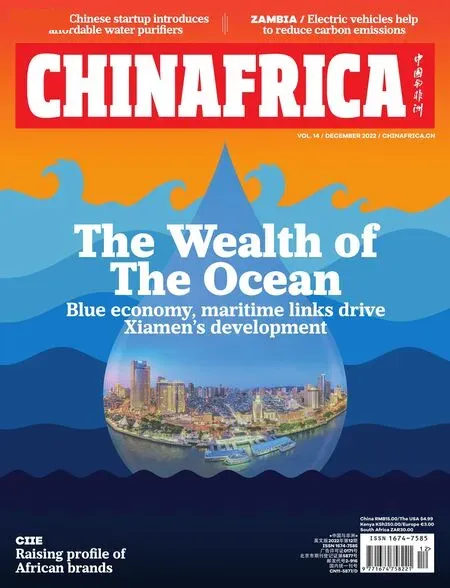Growing Footprint
By XIA YUANYUAN
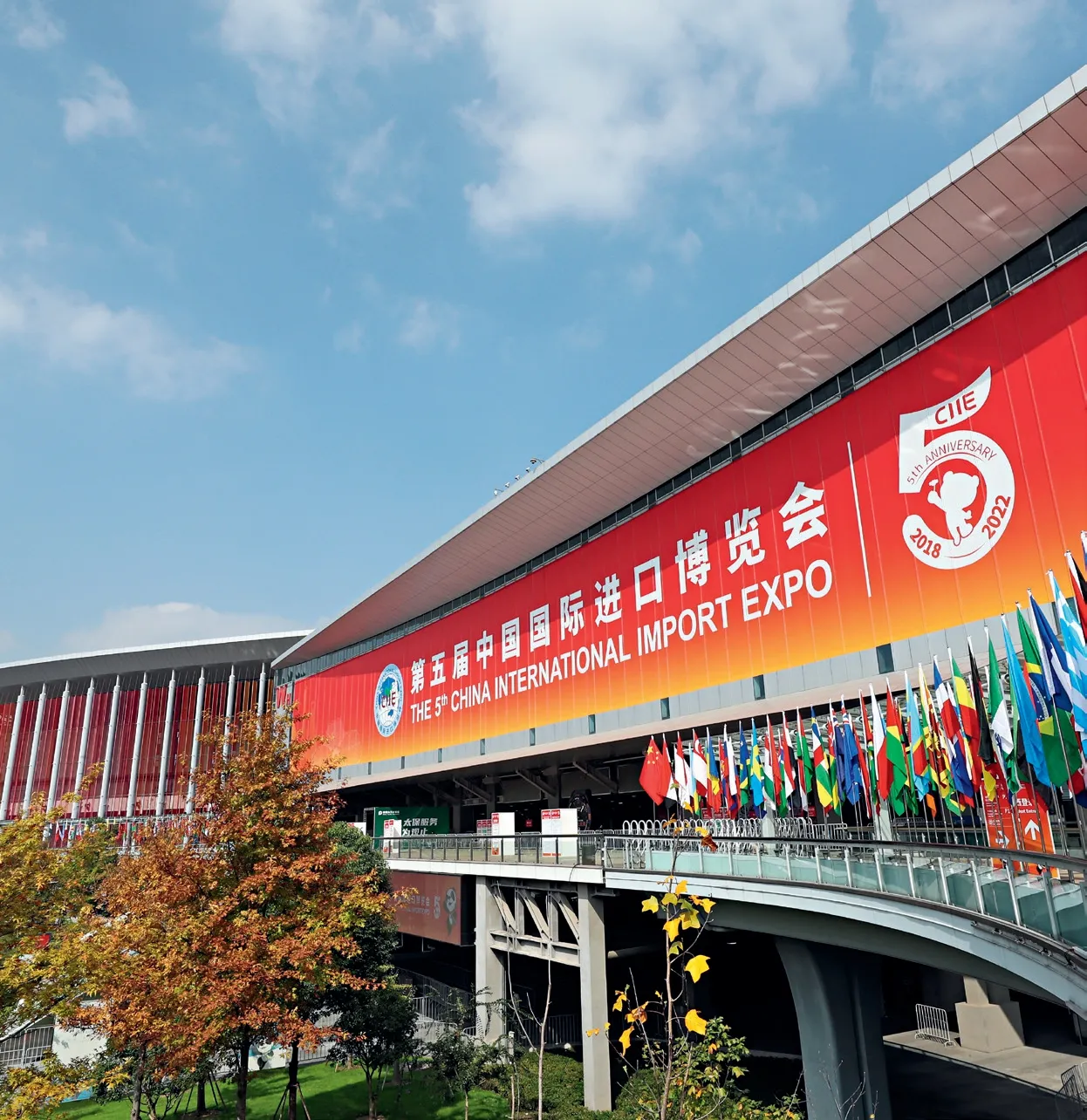
A view of the venue of the expo on 2 November
African products aim to boost China sales through participation in the CIIE
Rwandan coffee, Kenyan avocado, South African wine, Zambian honey, Zimbabwean tea …Many African products were prominently displayed at the Fifth China International Import Expo (CIIE), in a bid to draw attention from the visitors and win more orders directly or indirectly.
The sizeable presence of African exhibitors at the expo shows that African businesses are increasingly looking to increase their sales in the Chinese market and raise their global profile through the expo. The CIIE this year witnessed the participation of 145 countries,regions and international organisations. Enterprises from 127 countries and regions attended the expo,held in Shanghai from 5 to 10 November.
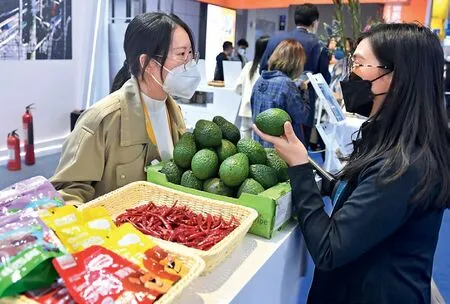
Avocados from Kenya are displayed at the Fifth CIIE on 7 November
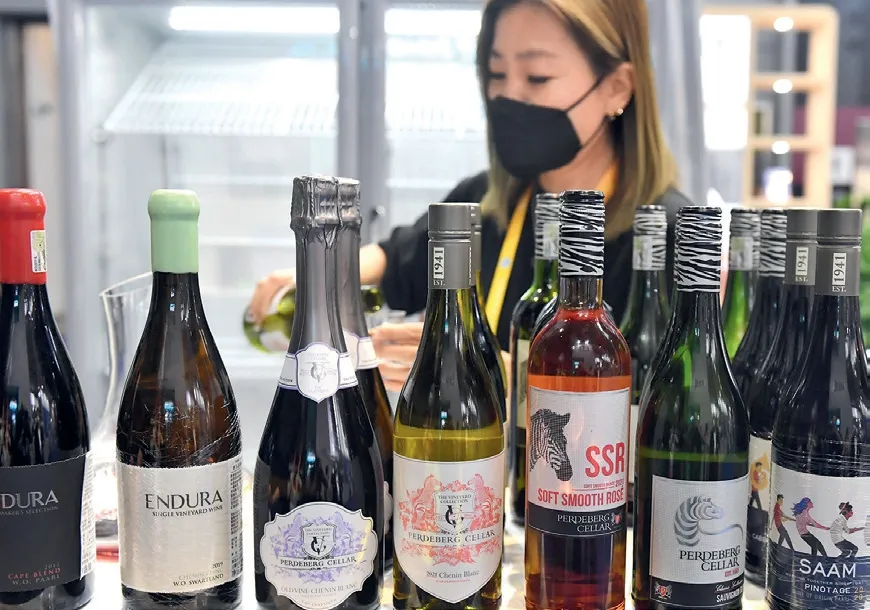
Wines from South Africa are displayed at the Fifth CIIE on 7 November
Grasiano Nyaguse, head of the Economic and Commercial Section of the Embassy of Zimbabwe in China, said that the CIIE provides an opportunity to showcase their products to the Chinese consumers.“It is an excellent conduit in that it brings together under one roof the largest number of buyers, importers and marketers (both online and offline) as well as the consumers themselves,” Nyaguse toldChinAfrica.
A showcase platform
As a 10-year-old Chinese coffee brand, Mellower Coffee uses Rwandan coffee beans with unique flavour. At its booth in the CIIE, the company exhibited products made from Rwandan coffee beans.
“Our coffee beans come from a Rwandan coffee manor at an altitude of 1,600 meters. There is plenty of sunshine, rain and volcanic soil. The coffee fruit takes a long time to ripen, and the beans are full of flavour,” Zhang Mingzhu, head of the Public Relations Department of Mellower Coffee, toldChinAfrica.
“Industry reports show that China’s coffee market will witness rapid growth. At the same time, Chinese consumers have higher requirements for coffee quality,and they are paying more and more attention to coffee taste. Coffee beans from excellent sources can allow consumers to fully appreciate the flavour of the origin,”Zhang said.
At this year’s CIIE, Mellower Coffee joined hands with the Rwandan Embassy in China to present first-class Rwandan coffee to Chinese consumers. “The CIIE has played an important role in promoting cross-border trade and driving global growth. We hope to use this platform to facilitate Rwandan coffee’s access to the Chinese and Asian coffee markets and help them grow,”Zhang added.
Among the Kenyan products on display at the CIIE are the organically produced avocados, which attracted great interest from visitors. Since August this year,Kenyan producers have managed to export 200 tonnes of avocados to the Chinese market, raising farmers’expectation for higher returns compared to the local market.
Adhere Cavince, a Kenyan scholar of international relations with a focus on China-Africa relations, said that at the CIIE, developing countries also have opportunity to attract investments through business matchmaking.“Investors from around the world often gather in China for the annual event to scout for bankable business ideas and products, making the expo a global public platform,” he said.
Increasing orders
This year, more types of products from South Africa were exhibited at the CIIE. Dried abalone, canned abalone, aloe vera gel and many kinds of wine were seen in the South Africa Pavilion of the expo.
According to the Chinese Embassy in South Africa,in the previous four editions of the expo, beef, wine,abalone, fruit, rooibos tea, aloe vera gel and other products from South Africa received a large number of orders, laying a good foundation for high-quality South African products to expand their market share in China.
Anil Sooklal, deputy director general for Asia and the Middle East at the Department of International Relations and Cooperation of South Africa, said that the expo is a major event for South Africa, Africa as a whole, and the international community. It not only promotes the development of China’s domestic market, but also makes China accessible to the larger global market.
At present, China-South Africa economic and trade cooperation is developing vigorously. The data released by the General Administration of Customs of China shows that from January to September this year, the total bilateral trade between China and South Africa reached $44.33 billion, up 11.8 percent year on year, in which China’s imports from South Africa were $26.2 billion, up 6.5 percent year on year.
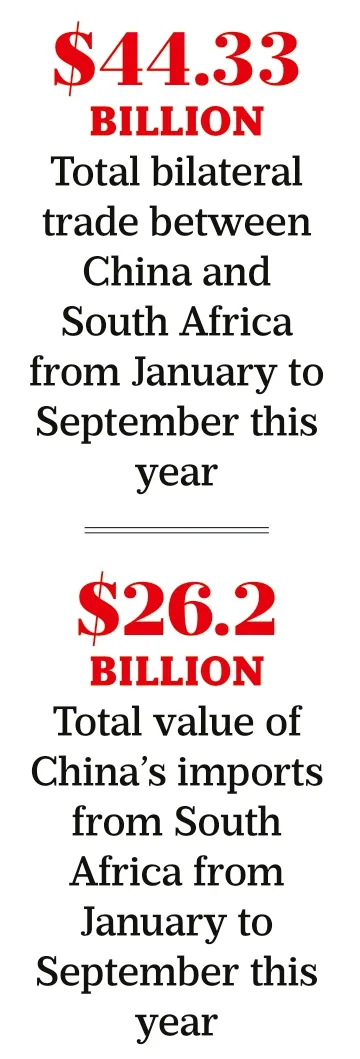
Agricultural producers from South Africa, for instance,struck deals worth $210 million at the CIIE in 2021,according to Zhao Zhongyi, minister counsellor of the Economic and Commercial Office of the Chinese Embassy in South Africa.
Benefitting farmers
The CIIE has a special significance for Rwanda’s Gorilla’s Coffee. The company, based in Rwanda’s capital Kigali,has already participated twice in the CIIE. It was first introduced to China at the First CIIE in 2018. Over the past four years, the producer behind the coffee brand, Rwanda Farmers Coffee, has been expanding its production scale so as to meet growing demand from Chinese consumers.
This year, the company hopes to further boost its sales in China, given the high quality of its coffee beans and convenience of making instant coffee.
David Ngarambe, CEO of Gorilla’s Coffee, said the CIIE “gives us the platform to showcase Rwandan coffee beans to more Chinese consumers.”
Located in Gicondo District, Kigali, the company currently gets its high-end coffee beans from farmers’cooperatives and can process about 9,000 kg of coffee beans a day, said Ngarambe.
In the past, in Rwanda, most farmers planting coffee beans did not know where their coffee was sent after being purchased, washed and baked. But now, that is changing.
“Our company currently cooperates with 4,000 farmers, nearly 40 percent of whom are female workers,” Ngarambe toldChinAfrica. The coffee roasting factory has boosted local employment and increased the income of coffee growers.
The company’s sales have been growing in the Chinese market, where it has developed a number of business partners, and it is gradually integrating into the international market. According to Yang He, head of Gorilla’s Coffee in China, the company currently exports about 30 tonnes of coffee to China every year.
James Kimonio, Rwanda’s ambassador to China,said that the expo and the online sales platform have eliminated the middlemen between Rwandan farmers and Chinese consumers. The local coffee bean growers can now earn an extra $4 for each bag of coffee sold.
“Increased business will generate more employment.For the farmers who supply the producers with various agricultural products, increased demand for their produce will mean more income for them. Higher incomes for farmers will result in an improvement in their quality of life as they are able to do more for their families in terms of better access to education, health, sanitation,housing, electricity and other essentials in life,” said Nyaguse from the Embassy of Zimbabwe in China.
According to Sun Chenghai, deputy director of the CIIE Bureau, the value of deals at the Fifth CIIE increased 3.9 percent compared with the previous year to $73.52 billion. CA

